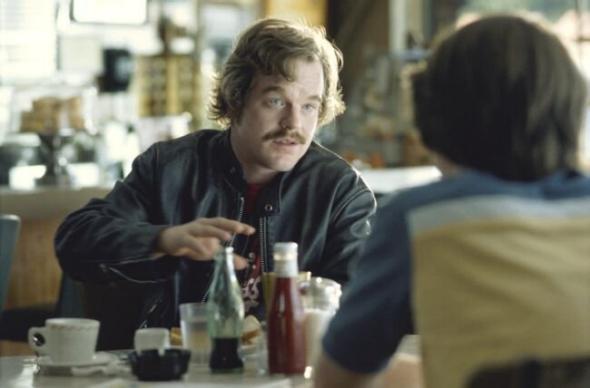Cameron Crowe Talks Philip Seymour Hoffman, _Almost Famous_
With the unfortunate news of Philip Seymour Hoffman’s passing over the weekend, the internet has been abuzz with those reminiscing about their favorite PSH role or simply quoting and re-quoting his brilliant work on the basketball court in Along Came Polly.
One of Hoffman’s most iconic roles, at least for us music fans, came in the form of his portrayal of Lester Bangs; the troubled, antagonistic rock journalist in 2000’s Almost Famous. For those of us who didn’t grow up in the world of the actual Lester Bangs (yes, kids, he was a real guy!), Hoffman’s depiction was our introduction. Disguising brilliance with smugness and bits of self-deprecation, Bangs attempts to mentor young journalist William Miller as he navigates the world of rock and roll, providing life lessons such as “don’t make friends with musicians” and (my personal favorite) “you’ll meet them again on their long journey to the middle” when referring to Miller’s classmates, who he says hate him. As far as smaller roles are concerned, this ranks among the best in film history. Lester Bangs was integral to the fabric of Almost Famous, and without him the film would lack authenticity.
Almost Famous director Cameron Crowe took to his aptly titled website TheUncool.com to talk about the role and one scene in particular, where Bangs has a brutally honest moment with Miller about life in the rock world. Crowe gives insight to Hoffman’s genius and ability to engross himself in a character. Here, Hoffman becomes Lester Bangs. Read on and revisit the scene below.
My original take on this scene was a loud, late night pronouncement from Lester Bangs. A call to arms. In Phil’s hands it became something different. A scene about quiet truths shared between two guys, both at the crossroads, both hurting, and both up too late. It became the soul of the movie. In between takes, Hoffman spoke to no one. He listened only to his headset, only to the words of Lester himself. (His Walkman was filled with rare Lester interviews.) When the scene was over, I realized that Hoffman had pulled off a magic trick. He’d leapt over the words and the script, and gone hunting for the soul and compassion of the private Lester, the one only a few of us had ever met. Suddenly the portrait was complete. The crew and I will always be grateful for that front row seat to his genius.




















